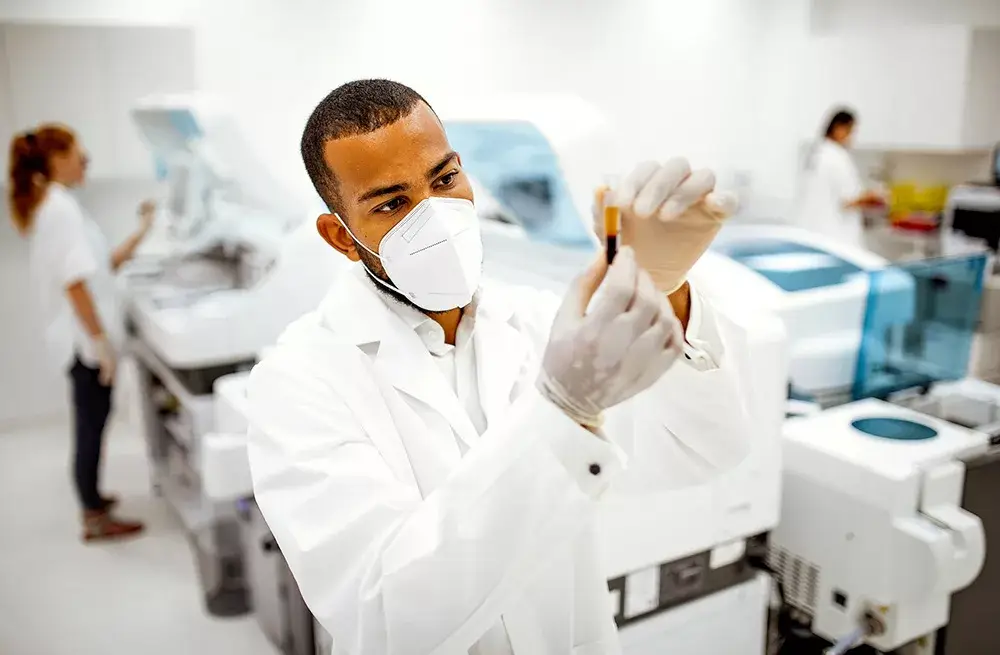Hormones are a new quickly expanding area of scientific and medical interest. These chemical messengers are produced by glands in the body and regulate various bodily functions, such as growth and development, metabolism, reproductive processes, mood, sleep, and immune response.
Hormones are often overlooked as a source of well-being. If you’ve noticed a shift lately in your overall mood, libido, your hormone levels may be the cause. Hormone testing is a highly accurate way of determining if you’re experiencing a hormone deficiency.
What Are Hormone Tests?
Hormone tests are medical tests that measure the levels of hormone molecules in a person’s blood, urine, or saliva. Hormone tests are usually ordered by a physician and require a small sample to analyze. You will also need a hormone test before beginning hormone replacement therapy of any kind.
Results are then interpreted by comparing the hormone concentration with established normal ranges for a person’s age, gender, and body weight.
Hormone tests can detect imbalances and abnormalities in hormone levels, which can cause various health problems, including thyroid disorders, diabetes, and infertility. For example, a thyroid-stimulating hormone (TSH) test can diagnose thyroid problems like hypothyroidism or hyperthyroidism, while a follicle-stimulating hormone (FSH) test can identify fertility issues and menopause.
Testosterone is another important hormone that is tested through blood panels. This test can identify testosterone levels and determine the need for testosterone replacement therapy to treat a list of testosterone related symptoms.
Different Types of Hormone Tests
There are several different types of hormone tests that can be used to diagnose and monitor various health conditions.
Blood Tests
Blood tests are the most common type of hormone test and typically measure the levels of hormones in the bloodstream.
Urine Tests
Urine tests can also be used to measure certain hormones, particularly for assessing hormonal activity over a period of time.
Saliva Tests
Saliva tests are also becoming more popular, especially for measuring cortisol levels in response to stress.
Imaging Tests
While not checking hormones specifically, imaging tests, such as ultrasounds, can help doctors or specialists visualize the glands and organs responsible for hormone production and release.
Depending on the specific hormones being tested, different types of tests may be more appropriate. Your provider and/or hormone specialist will help you determine which test is most appropriate for your needs.

What Does a Hormone Test Tell You?
A hormone test can be used to diagnose or monitor hormone-related medical conditions such as:
- Thyroid imbalances
- Diabetes
- Adrenal gland dysfunction
- Pituitary disorders
- Infertility
- Certain types of cancer
Hormone tests also help identify the cause of symptoms such as weight gain, fatigue, mood swings, libido changes, and irregular periods.
The results of a hormone test can provide valuable information for developing individualized treatment plans, determining the effectiveness of ongoing treatments, and making lifestyle adjustments to improve hormone balance and overall well-being.
When Should I Check My Hormone Profile?
As with most medical issues, the best time to check for hormone imbalance is as soon as you notice or begin to experience symptoms.
A proactive approach to health is never a bad thing, either—you may want to schedule a semi-regular hormone panel once you reach a certain age.
Check Your Hormones if You Experience Symptoms
It’s important to consider getting your hormones checked if you’re experiencing symptoms related to hormonal imbalances. Some common symptoms can include changes in mood, weight gain or loss, irregular periods, decreased sex drive, and fatigue.
For women specifically—if you’re experiencing infertility issues or menopausal symptoms, it’s important to consider getting your hormone levels checked. Your primary care provider or gynecologist can help determine if hormone testing is necessary and recommend the appropriate tests.
Check Your Hormones As You Age
The age at which men and women should start getting their hormones checked depends on various factors such as family history, hormonal imbalances symptoms, or health concerns.
Generally, men with symptoms such as low libido, erectile dysfunction, fatigue, and mood swings should consider getting their hormone levels checked in their 30s and 40s.
Women with similar symptoms, irregular periods, and fertility issues should consider getting their hormone levels checked in their 20s and 30s. Additionally, women approaching menopause may also benefit from getting their hormone levels checked.
Ultimately, the decision to get hormone testing should be made in consultation with a healthcare professional, who can assess an individual’s personal health history and recommend further testing or treatment if necessary.

What Should I Do Before Hormone Testing?
Before hormone testing, it is important to speak to your healthcare provider and discuss your concerns and symptoms. Your healthcare provider may recommend specific tests based on your individual needs.
Once you schedule a hormone lab panel, it is important to prepare for the test by following any instructions provided by your healthcare provider, such as fasting or avoiding certain medications.
You should also inform your healthcare provider of any medications or supplements you are currently taking, as certain substances can affect hormone levels.
It is important to be open and honest with your healthcare provider regarding any past medical history or conditions, as this information can be helpful in accurately interpreting test results.
How To Get a Hormone Panel
Getting a hormone panel done involves a few steps.
1. Speak with your healthcare provider
The first step is to speak with your primary care provider or a hormone specialist. They will assess your symptoms and determine if you are a good candidate for a hormone panel. If so, they will write an order for the lab tests and provide you with their recommendations based on the results.
2. Research a Hormone Specialist
While your primary care doctor may be able to get a blood sample, they’ll likely send it off to a lab to get analyzed. You’ll benefit from going directly to a hormone specialist like Blue Sky MD who can draw a blood sample, help you understand the results, and provide hormone replacement therapy to treat symptoms all in one place.
3. Schedule a Lab Panel
Once you have the order from your healthcare provider, you can go to a lab that provides hormone testing. Most—if not all—labs require an appointment, so it’s best to schedule your hormone lab panel appointment well in advance.
4. Get Your Hormones Analyzed
On the day of your appointment, the lab technician will draw your blood and send the sample to the lab for analysis. Results may take a few days to a week, depending on the specific tests ordered.
Keep in mind that hormone panels may not be covered by insurance, so it’s important to check with your provider and your insurance company about coverage and any associated costs.
North Carolina’s #1 TRT CLINIC
Since 2008, we’ve been at the forefront of TRT in North Carolina. Learn more about our life-changing testosterone therapy program for men.

What to Expect During a Hormone Test
While there are several types of hormone tests, a blood panel is quite common. During a hormone test at Blue Sky MD, one of our providers will draw a blood sample to evaluate your levels of various hormones.
The exact hormones that are tested will depend on the reason for the test. For example, if you are being evaluated for potential thyroid dysfunction, your provider may test your levels of thyroid-stimulating hormone (TSH) and thyroxine (T4).
Depending on the specific test, you may be asked to fast for a period of time and/or avoid certain medications in the days leading up to your test. Other tests, such as a cortisol test, may require that you collect multiple samples over the course of a day to get an accurate picture of your hormone levels.
The test itself consists of a quick blood draw, which typically takes only a few minutes. After the blood is drawn, it will be sent to a laboratory for analysis. Your healthcare provider will then use the results of the test to help diagnose any hormonal imbalances or conditions that may be impacting your health.
How To Request a Hormone Test
If you’re ready to check your numbers, have discussed it with a primary care provider, or are interested in learning more information about a hormone test, simply contact us today to get started.
Our hormone lab blood testing is done here in the clinic and sent off to our very own Blue Sky MD hormone lab testing facility, where we’ll analyze results with high precision to help you understand your hormone levels, symptoms, and next steps. We look forward to meeting you!

Dr. David LaMond, MD
Medical Director
Dr. David LaMond is the founder and Medical Director of Blue Sky MD. He has been a the forefront of hormone therapy and weight loss since 2008. Drawing from his foundation and board certification in Family Medicine, he has created the core medical principles behind the Blue Sky MD concept of total patient care. He is an active member of the American Society of Bariatric Physicians, American Society of Laser Medicine and Surgery and American Academy of Family Physicians.
FREQUENTLY ASKED QUESTIONS
Hormone levels surge at different times depending on the specific hormone and the biological process it affects.
For example, in women, levels of estrogen and progesterone typically surge during the menstrual cycle to regulate ovulation and prepare for potential pregnancy.
The hormone cortisol, which is linked to stress, typically surges in the morning to help increase energy levels for the day ahead.
Testosterone levels in men tend to be highest in the morning as well, but also surge during puberty and in response to physical activity or sexual stimulation.
Other hormones, such as growth hormone and insulin, can also surge in response to specific triggers, such as exercise, fasting, or sleep.
There is no one-size-fits-all test for female hormone balance, as different hormone imbalances require different diagnostic approaches.
However, there are a number of tests that can be used to evaluate hormonal function in women. These tests include blood tests to measure levels of estrogen, progesterone, and testosterone, as well as tests of thyroid function and adrenal function.
There are also various functional tests that can be used to evaluate hormone balance, such as saliva or urine tests that assess hormone metabolites.
Depending on your symptoms and health history, your healthcare provider can recommend the best tests to assess your hormone balance and develop an appropriate treatment plan to rebalance your hormones.
The best day of the menstrual cycle to test hormones depends on the specific hormone being tested. For example, follicle-stimulating hormone (FSH) and luteinizing hormone (LH) levels are typically measured on days 2-5 of the menstrual cycle. Estrogen levels are best measured on days 2-3 or 21-23 of the cycle. Progesterone levels can be measured on day 21 of a 28-day cycle. Testosterone levels can be measured at any time during the menstrual cycle.
However, if you’re not sure about the timing of hormone testing or have concerns about your hormone levels, you will need to talk to your primary care provider or a hormone specialist.
Hormonal tests for women typically measure levels of various hormones in the blood or urine. These tests are commonly used to diagnose conditions related to reproductive health, such as polycystic ovary syndrome (PCOS), infertility, and menopause. Common hormonal tests include:
1. Follicle-stimulating hormone (FSH): This hormone is produced by the pituitary gland and helps regulate the menstrual cycle.
2. Luteinizing hormone (LH): This hormone also helps regulate the menstrual cycle and is responsible for triggering ovulation.
3. Estrogen: This hormone is produced by the ovaries and helps regulate the menstrual cycle.
4. Progesterone: This hormone is also produced by the ovaries and helps prepare the uterus for pregnancy.
5. Testosterone: This hormone is produced by the ovaries and is important for maintaining bone density and muscle mass.
6. Thyroid hormones: These hormones help regulate metabolism and can affect reproductive health if they are imbalanced.
In some cases HRT isn’t covered by insurance and is considered an “elective procedure”.
In other cases HRT is a necessary medical treatment and qualifies for insurance coverage.
For those who aren’t covered, Blue Sky MD offers affordable self-pay options. Contact us to find out if we can bill your insurance



